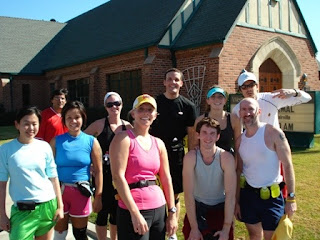
That's me on the right with the pace group I've been training with since September. This photo is from February 3 when we did our longest run to date. I did 23 miles. The wierd thing about Marathon training is that it takes so long to fully recover from a long run that we deliberately don't do any runs longer than 8 miles for a full month before the marathon itself. So I did that 23 mile run a full month ago, and now I've just got to kind of guess as to whether I'm up for 26 miles this Sunday. Everybody asks if I'm ready but the only reference point I have is a slightly shorter run I did a month ago. I did OK back then but whether I'm prepared for this Sunday, who knows? I guess that's what they mean by faith.




